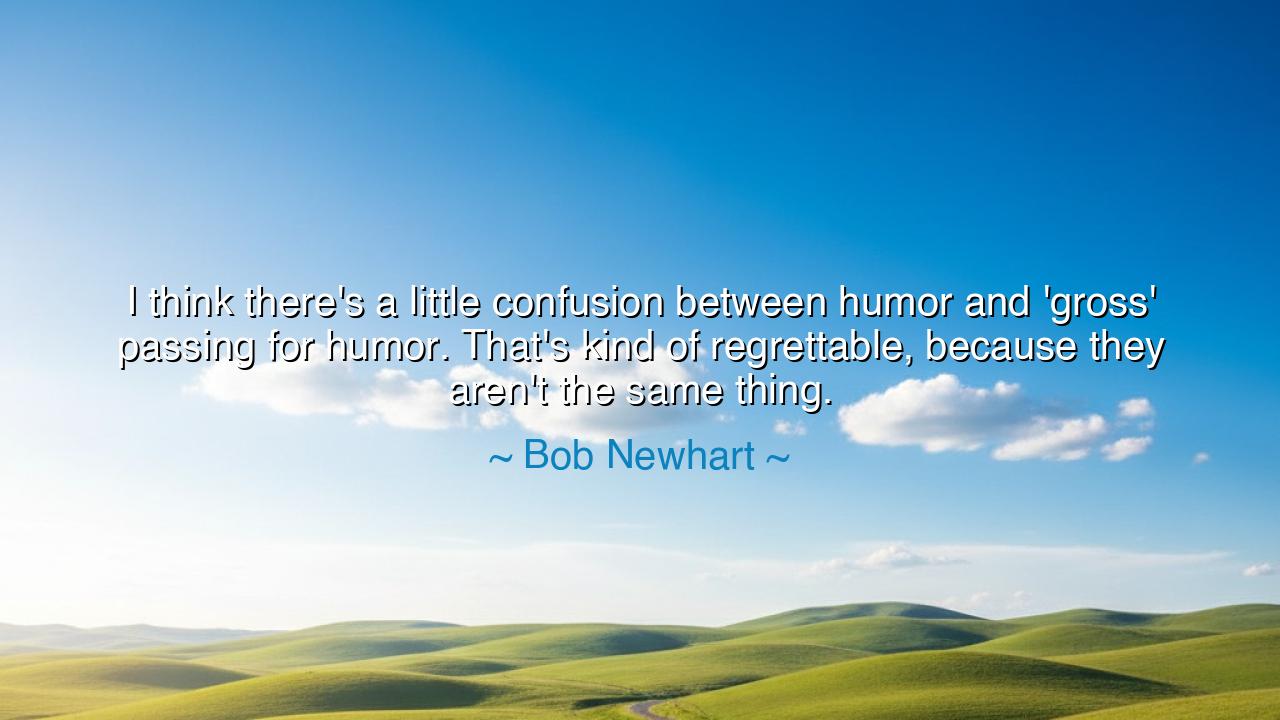
I think there's a little confusion between humor and 'gross'
I think there's a little confusion between humor and 'gross' passing for humor. That's kind of regrettable, because they aren't the same thing.






In the heart of the human experience, where wisdom and folly intertwine, there lies a force both sublime and essential to the spirit: humor. It is a balm for the soul, a light that illuminates the darkness of our existence. But as the great sage Bob Newhart wisely observed, "I think there's a little confusion between humor and 'gross' passing for humor. That's kind of regrettable, because they aren't the same thing." In these words, Newhart speaks to a truth as old as time itself—that humor, in its purest form, is not something crude or exaggerated, but a refined expression of insight into the human condition. The confusion between true humor and gross or vulgar displays is a tragedy of our age, for it strips away the dignity of what humor can truly offer.
In the ancient traditions, humor was revered as a tool for wisdom. It was not simply a means to make people laugh, but a way to impart deeper truths about the world and the soul. Socrates, whose very life was a reflection of profound irony, used humor not to insult or degrade, but to lead others toward self-awareness. His humor was subtle, sharp, and yet always respectful, a mirror reflecting the absurdities of life without ever indulging in crudeness. The ancient philosophers understood that true humor lies in the balance between insight and restraint—the ability to laugh at life’s contradictions while maintaining its dignity.
Gross humor, on the other hand, is a distortion of this art. It is a disturbance in the natural flow of humor, one that seeks to shock or disgust rather than enlighten. It may garner laughter, but it is a laughter born of discomfort, not understanding. Aristophanes, the playwright of ancient Athens, often employed humor to critique the societal norms of his time. Yet, even his sharpest jests carried a sense of nobility—they aimed not to degrade, but to provoke thought. In the same vein, Newhart’s humor does not seek to offend, but to gently expose the absurdities that lurk beneath the surface of our lives. True humor elevates, while gross humor diminishes, focusing not on insight but on excess.
The difference between these forms of humor is as ancient as the struggle between virtue and vice. The philosopher Marcus Aurelius, in his reflections, often used humor to show the fragility of human pride and ambition, yet it was humor that invited the reader into a space of reflection. It did not degrade or tear down; it built up the soul by offering a clearer view of the self. In this way, humor was a companion to wisdom. Gross humor, however, seeks to tear down—not to build, but to mock, not to enlighten, but to leave the soul empty and unrefined. It is an unfortunate distortion of what could be an instrument of growth.
So it is that Bob Newhart calls us to reflect upon the nature of humor in our own lives. In an age where vulgarity is often passed off as humor, we must recognize the true value of humor—humor that elevates, that provides insight, and that invites us to laugh not at others but at the absurdities within ourselves. We must not mistake the loud, jarring laughter that comes from vulgarity for the quiet, deep laughter that springs from the well of understanding. The former leaves the spirit empty, while the latter fills the heart with joy and clarity.
In the great stories of history, we see that the most profound humor is born of wisdom, not crudeness. Take, for instance, the wisdom of Confucius, who, though often serious in his teachings, occasionally used humor to reveal the contradictions within human nature. His humor was never crude—it was a refined observation of the world that, when shared, led others to wisdom. Similarly, Newhart’s humor, though often dry and understated, offers profound insights into the human condition without resorting to the gross or vulgar. It is an invitation for us to approach life with both dignity and humility.
Let us then, as we walk this earth, understand the difference between these two forms of humor. Let us embrace humor that builds up, that elevates the spirit, that speaks to the truth without resorting to crude or exaggerated means. We are called not to indulge in the vulgarity of the world, but to rise above it, to find joy in the simple and the true. Humor, when done with restraint and insight, can be a tool for growth, both for ourselves and for those we share it with. Let us then seek the wisdom in humor and not confuse it with the empty laughter of excess. Through this, we shall not only entertain but enlighten, and in that enlightenment, find joy.






AAdministratorAdministrator
Welcome, honored guests. Please leave a comment, we will respond soon